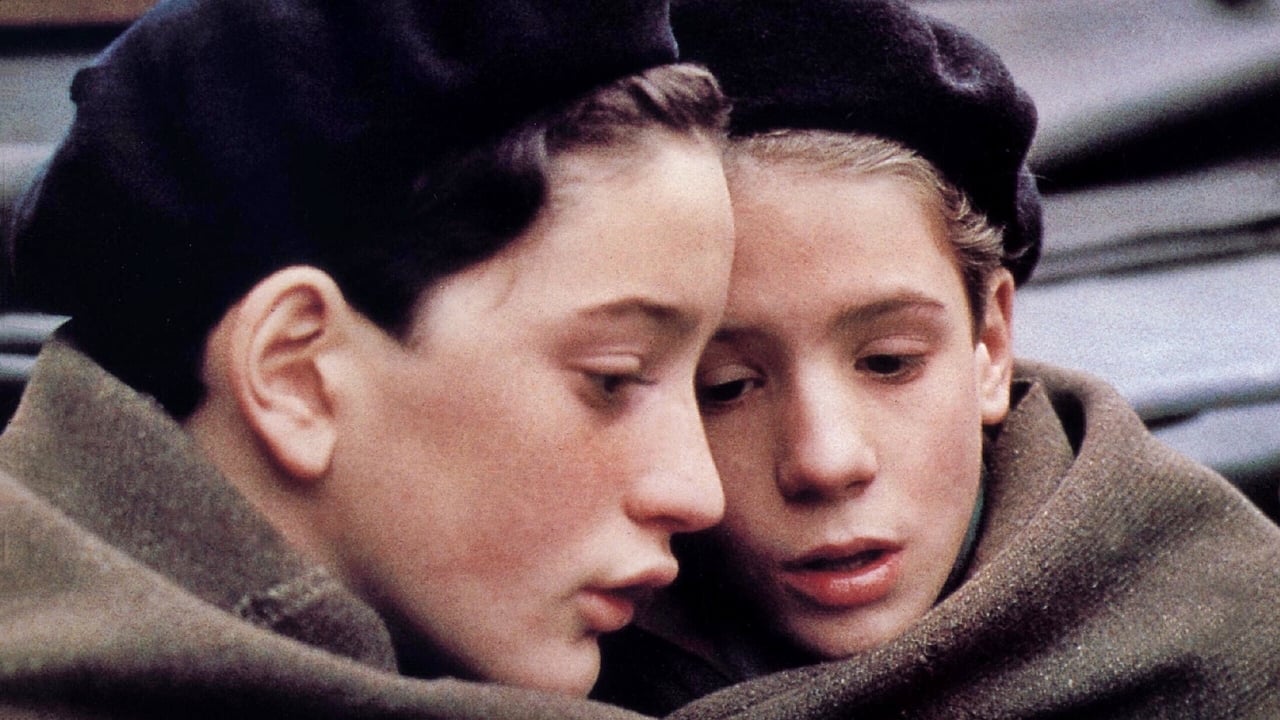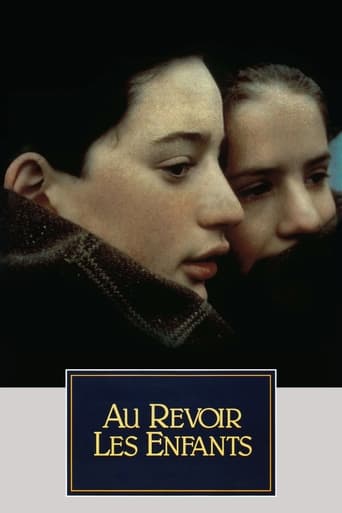

Upon the first viewing of Au revoir les enfants, we are as engrossed into the mystery of Jean Bonnet as the young Julien Quentin is. And on a second viewing, the little clues become a great deal clearer, and we are able to piece together the puzzle a little quicker than the inquisitive young boy. But of course the modern older viewer has the frame of context and knowledge that Julien does not have - he knows the telltale signs of a Jew, but cannot figure out why they are hunted and persecuted so diligently, when all he sees is one of his close friends. And so the entire film is tinged in regret; even as Jean reminds him that he would have been caught anyway, we feel the chain of events that lead to that monumental morning being so painful to remember, and that one fatal glance that led to a death on his hand. Louis Malle works with his memories and experiences, and here he has crafted a group of young schoolboys so reminiscent and convincing. He has captured that remarkable knack and ability of young boys to be able to hastily create relationships out of nothing, sever them, and hastily mend them all over. They pipe up at any opportunity to make a joke on someone else's behalf, and take playful violence to the limit, and are all friendly the next day. And any child would remember cheering whenever they got a break from school-work - here it is within the grim context of air raids, but they cheer anyway, and when the teacher starts a prayer, they all instinctively join in. Why this succeeds is that Malle does not overdo the World War 2 setting; these boys certainly do not take the war so seriously, so he takes on that viewpoint. They playact as knights on stilts and knock each other over as real soldiers fight, but it might as well be another day for them. They trade books with dirty stories in them, and cackle at a rare viewing of Chaplin. When a German soldier stands up to a French collaborator in the restaurant and the whole establishment rallies around an elderly Jewish customer, there is an sinister undercurrent about it, but this is viewed through the innocent lens of Julien, who seems to know that what is happening is bad, and instinctively covers for his Jewish friend, but does not understand why being Jewish is bad thing. He is at the centre of the narrative, at the tender age where he is still a mummy's boy, but like many blossoming teenagers puts on a braver, cooler front: indeed his first lines to Jean are a thinly veiled threat to not mess with him. He has little moments of cheekiness and intelligence, bartering his mother's jam and pretending to drown in the bathtub to avoid the wrath of taking too long. And there is a subplot of his uncertainty around his future aspirations that links towards the courageous actions of the priest Père Jean; mentors whisper that he does not quite have the calling of priesthood, and his mother coddles and suggests taking on the same occupation as his father in engineering, and in the same vein his piano playing is not quite up to scratch, so he is recommended taking up violin. But he does have those same qualities as Père Jean anyway. A bitter Joseph mocks him for being so pious and generous when it is war and it is every man for himself - "They're just Jews," he spits outs. But it is the rejection of this statement by Julien that rings so true and brave - it is in those small acts of defiance, and those brief friendships that shine brightly in the darkness of the Holocaust, that our humanity remains.
... View MoreI loved the movie but there seemed to be one scene that didn't ring true. It is regarding the treatment of Jews during the Nazi occupation of France, so I would appreciate any input from French or Jewish readers or World War II buffs especially cognizant of that era. After 4 years of Nazi occupation and the pro-Nazi Vichy government under Petain, who gave free reign to the Gestapo to do whatever they pleased, wasn't it pretty obvious to the remaining Jews that they had to hide to survive? Why would that elderly Jewish man be sitting there in broad daylight in a public restaurant frequented by Nazis? And why wouldn't the priest have warned the Jewish child not to go into the town much less go to a public restaurant? In another film about that period, Francois Truffant's "The Last Metro", Catherine Deneueve's character Marion Steiner hides her Jewish husband Lucas Steiner in the cellar below her Paris theater to prevent him from being arrested by the Gestapo and sent to a concentration camp and certain death. That movie was set in 1942, two years before "Au Revoir Les Infants". Which is accurate?
... View MoreI have been able to recall many titles featuring in the book 1001 Movies You Must See Before You Die, and this French film is one of those that I remember and was certainly looking forward to watching, from BAFTA winning director Louis Malle (Atlantic City). Basically, set during World War II, and term is beginning at a Catholic school run by priests, and upper class boy Julien Quentin (Gaspard Manesse) and his brother François (Stanislas Carré De Malberg) are attending after being on vacation, and Julien reestablishes himself as the leader of the fellow students. The school sees a new student arriving, Jean Bonnet (Raphael Fejtö), who instantly becomes a victim to bullying by the other boys, and of course Julien does not like him for a while. As time goes by though Jean does become much more part of the gang and accepted, and he gains a friend in the leader, Julien even finds out Jean is Jewish and hiding out from the Nazis. There are a few other things happening while the boys attend their lessons and hang out together, such as assistant cook Joseph (François Négret) caught selling food on the black market. The big point come though when Nazis are searching the school, aware that there may be Jewish students hiding out, and in the end Jean and three others are caught and taken away, leaving Julien devastated. Also starring Francine Racette as Mme Quentin, Philippe Morier-Genoud as Father Jean, François Berléand as Father Michel and Peter Fitz as Muller. The cast of young actors all do pretty well, I will admit I did not understand everything going on, but it is an interesting enough story and concept from what I did follow, especially as it is semi-autobiographical based on the past of the director, I suppose it is a Second World War drama to see. It was nominated the Oscar for Best Foreign Language Film and Best Writing, Screenplay Written Directly for the Screen, it was nominated the BAFTAs for Best Film, Best Film not in the English Language and Best Original Screenplay, and it was nominated the Golden Globe for Best Foreign Language Film. Good!
... View MoreThe sad days of France during WWII take a new meaning, as a Jewish mother, in order to spare her young son of the horrors of the times, decides to send him to a catholic boarding school, where the local Carmelite priests welcomed, and protected, some of these unfortunate children. It was not an easy for Jean Bonnet, the newly arrived boy to settle into a world that was totally foreign to him.One thing becomes clear immediately, Jean was a smart kid, way ahead of his classmates. He was an easy object of ridicule because of his introspective nature. At the same time, Jean attracted the attention of Julien Quentin, who went on to become Jean's best friend, and whose life was touched by the incident he lived at the school. Life in the boarding school was not a happy one for many of the children. Being away from family took a heavy toll on most of them, while for others was a great time to be away in a somewhat safe environment. Justin, who spies on Jean as he prays during the night, is the first to discover his real identity, which was a well kept secret. In fact, Justin is quite concerned as the boys are brought to a bath house knowing Jews were not welcome. The same goes when during mass, Jean makes an attempt to receive communion from one of the priests, who clearly knew he was not catholic and passes him by without giving him the sacrament. The film is Louis Malle's tribute to a similar incident he lived during his boyhood. It is the most autobiographical of his work, dedicated to his children. "Au revoir les enfants" is a timeless account about an era in which the horrors of the war was seen through the eyes of innocent children, totally at sea in the madness going on around them. The gloomy winter atmosphere was photographed by Renato Berta, a frequent collaborator of Mr. Malle.The two principals do an excellent work. Gaspard Manesse who played Justine Quentin and Raphael Fejto, showed great promise, but did not go into great screen careers as one would have hoped.
... View More